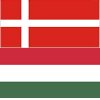 In 2014 one of the biggest challenge in Hungary is to find someone who is not thinking to work abroad for a shorter or longer period.
In 2014 one of the biggest challenge in Hungary is to find someone who is not thinking to work abroad for a shorter or longer period.
It is not only true for a persons, but more and more company is thinking on the same: getting business in new countries.
Working in an international environment is really motivating , but can be quite challenging for companies!
Since CoDe ltd is a small entity, lately an IT expert cluster created in Hungary, involving 6 SME. It is called skillPOOL Expert Cluster, and all together we have 80 expert in telco and Bank IT. ( http://skillpool.blog.hu)
This Cluster now is also focusing on how to get into different market. (North EU, Middle-East, Africa, etc)
I am (Sandor Seres) from CoDe was working in Denmark, but had business all over the world. From El Salvador to Brisbane Australia. From Bergen, Norway to Cape Town South-Africa. In my time in Roskilde,Denmark I was working together with Henrik Rosenstand.

So I am asking Henrik how he see our chance?
SAS: What cultural difference you see between Denmark (Scandinavia) and for example East-Europe region (maybe personal and/or company culture)?
HR: Outside Scandinavia most companies has a deep organization with different layers of managers whereas Scandinavian companies have a very short distance been the employee and the management. An organization with many managers will often enforce a top-down management approach which can be seen in US companies but also in many organizations in e.g. East-Europe or in Middle East countries.
Working in such a to-down managed company will make the employee act on instructions and most often reduce the personal initiatives. In Scandinavia we often see employees taking a lot of initiatives, which in many cases is valuable but which often also is very difficult to manage and planning and execution can be a challenge.
These two different structures makes corporation between organizations in different locations a bit complex, managers may not have any experience with managing teams at the other location and employee may not know what their manager expect. In order to make a corporation successful awareness and processes has to be established to deal with these issues. The process have to be enforces and only long term when expectations are aligned process may be adjusted accordingly.
SAS: What a foreign company should do to get project in DK? Where to start?
HR: The company should be aware of the cultural issues and should not neglect the issues in order to get a corporation with a Danish company. A company that address the cultural issues will be seen as much more trustworthy than companies that just claim to be the “world leader”. The company should be ready to do some investments in establishing a corporation to Danish (or Scandinavian) companies as it may require that some moves to Scandinavian for a short while to become the bridge to a team in another country.
SAS: Would it be possible to sell services (like agile project, consulting, etc) or it is mandatory to have product to sell?
HR: I don’t think it is required to have a product to sell, but as there are many companies offering outsourcing services, it is important to have a strong knowledge base to use as a sales platform. If you combine knowledge in a specific area with services then you should have a strong platform for selling services.
SAS: Is there a limit ( a type of minimum entity size, min revenue, etc) when a foreign vendor is accepted?
HR: The overhead for entering into a corporation needs to be taken into account when start working together. This means that often is requires a bit larger team on both sides to make a successful corporation. The exception is if a company signup based on some very specific knowledge then it there will often be one or few people involved.
SAS: Would this cluster format help to get more business in Scandinavia? (increased size, wider expertise)
HR: The cluster format would be beneficial when you would like to offer a larger team, but if focus is to offer an expert with very deep knowledge in an area, then it doesn’t matter. Often when you are in a corporation with other companies, you will ask if you could appoint other people with other skills and then the cluster format could become beneficial again.
SAS: Do you see advantage of working with a company from inside EU or or outside?
HR: From time to time it is important to get together e.g. when starting new projects. Traveling and working for some time in other countries is much easier if you don’t have to get a working permit and thereby the barrier is much smaller when all partner are within EU.
SAS: What skill should a foreign company have in order to be chosen on a tender when there are many competitors offering exactly the same solution with same favourable conditions (price, terms, warrant) even if one is a local company.
HR: The absolute biggest advantage is if you have expert knowledge in the specific domain area, and second can document that you have been in similar corporations before. You need to select the opportunities based on domain area in order to open the door and get an agreement. After having signed the first agreement it often becomes much easier to get into new areas within the same company or in associated companies. You probably still have to document that you have or have access to strong domain knowledge.
SAS: Would price be a major selection factor or quality and reliability ?
HR: For some companies price is the main factor, my advice is to stay away from these companies as they may switch to another company when they get an cheaper offer. What you should focus on is to build a long term relationship, and this can only be done if there is more factors than price that matters. The only reason to step into a price dumping competition is to get the first reference, but then you should be ready to stay in that relationship for some time even though that it may not be a good business case.
SAS: What skill you have short supply in Scandinavia currently?
HR: This is very difficult to generalize, as there is always a need for experts. A lot of Scandinavian software product companies are focused on making their products available in the cloud, and in general there is very few very knowledge people in this area. Similar all of these companies would also like to become even more mobile and Apps development is also often an area where experts is a limited resource. General development skills are less of a problem, and you would often end up in a price competition.
SAS: Thanx Henrik. Glædelig Jul!
To read: Answers to 5 Typical Questions from Non-Danes Working with Danes





